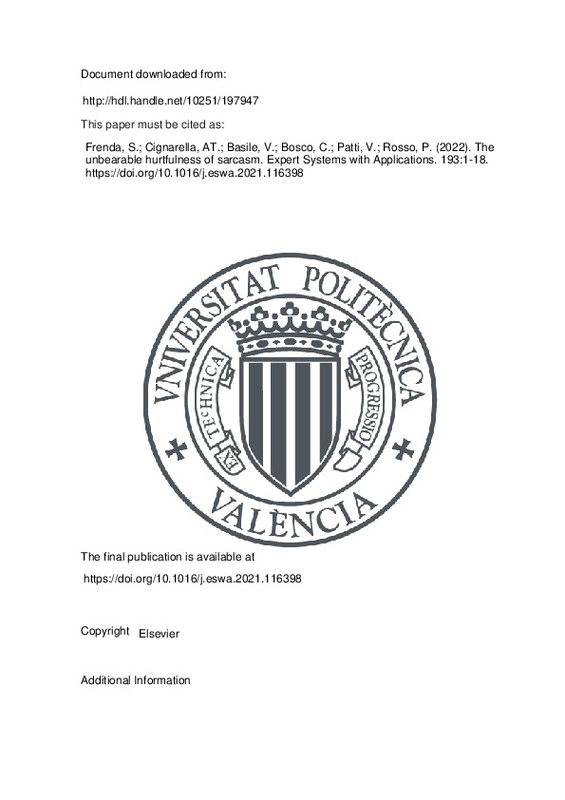JavaScript is disabled for your browser. Some features of this site may not work without it.
Buscar en RiuNet
Listar
Mi cuenta
Estadísticas
Ayuda RiuNet
Admin. UPV
The unbearable hurtfulness of sarcasm
Mostrar el registro sencillo del ítem
Ficheros en el ítem
| dc.contributor.author | Frenda, Simona
|
es_ES |
| dc.contributor.author | Cignarella, Alessandra Teresa
|
es_ES |
| dc.contributor.author | Basile, Valerio
|
es_ES |
| dc.contributor.author | Bosco, Cristina
|
es_ES |
| dc.contributor.author | Patti, Viviana
|
es_ES |
| dc.contributor.author | Rosso, Paolo
|
es_ES |
| dc.date.accessioned | 2023-10-10T18:01:57Z | |
| dc.date.available | 2023-10-10T18:01:57Z | |
| dc.date.issued | 2022-05-01 | es_ES |
| dc.identifier.issn | 0957-4174 | es_ES |
| dc.identifier.uri | http://hdl.handle.net/10251/197947 | |
| dc.description.abstract | [EN] In the last decade, the need to detect automatically irony to correctly recognize the sentiment and hate speech involved in online texts increased the investigation on humorous figures of speech in NLP. The slight boundaries among various types of irony lead to think of irony as a linguistic phenomenon that covers sarcasm, satire, humor and parody joined by their trend to create a secondary or opposite meaning to the literal one expressed in the message. Although this commonality, in literature sarcasm is defined as a type of irony more aggressive with the intent to mock or scorn a victim without excluding the possibility to amuse. The aggressive tone and the intent of contempt suggest that sarcasm involves some peculiarities that make it a suitable type of irony to disguise negative messages. To investigate these peculiarities of sarcasm, we examined the dataset of the IronITA shared task. It consists of Italian tweets about controversial social issues, such as immigration, politics and other more general topics. Each tweet is annotated as ironic and non-ironic, and, at a deeper level, as sarcastic and non-sarcastic. Qualitative and quantitative analyses of the dataset showed how sarcasm tends to be expressed with hurtful language revealing the aggressive intention with which the author targets the victim. While irony is characterized by being offensive in hateful context and, in general, moved by negative emotions. For a better understanding of the impact of hurtful and affective language on the detection of irony and sarcasm, we proposed a transformer-based system, called AlBERToIS, combining pre-trained AlBERTo model with linguistic features. This approach obtained the best performances on irony and sarcasm detection on the IronITA dataset. | es_ES |
| dc.description.sponsorship | The work of S. Frenda, A.T. Cignarella, C. Bosco and V. Patti was partially funded by VolksWagen Stiftung and Compagnia di San Paolo, Italy under the call "Challenges for Europe'' for the research projects "STudying European Racial Hoaxes and sterEOTYPES'' (STERHEOTYPES, S129542). The work of V. Basile, A.T. Cignarella, C. Bosco and V. Patti was partially funded by Google, Italy under the call "Google.org Impact Challenge on Safety'' for the project "Be Positive!''. Finally, the work of P. Rosso was partially funded by the Spanish Ministry of Science and Innovation, Spain under the research project MISMIS-FAKEnHATE on MISinformation and MIScommunication in social media "FAKE news and HATE speech'' (PGC2018-096212-BC31) and by the Generalitat Valenciana under DeepPattern, Spain (PROMETEO/2019/121). | es_ES |
| dc.language | Inglés | es_ES |
| dc.publisher | Elsevier | es_ES |
| dc.relation.ispartof | Expert Systems with Applications | es_ES |
| dc.rights | Reconocimiento - No comercial - Sin obra derivada (by-nc-nd) | es_ES |
| dc.subject | Affective language | es_ES |
| dc.subject | Hurtful language | es_ES |
| dc.subject | Irony detection | es_ES |
| dc.subject | Sarcasm detection | es_ES |
| dc.subject | Linguistic features | es_ES |
| dc.subject | AlBERTo | es_ES |
| dc.subject.classification | LENGUAJES Y SISTEMAS INFORMATICOS | es_ES |
| dc.title | The unbearable hurtfulness of sarcasm | es_ES |
| dc.type | Artículo | es_ES |
| dc.identifier.doi | 10.1016/j.eswa.2021.116398 | es_ES |
| dc.relation.projectID | info:eu-repo/grantAgreement/AEI/Plan Estatal de Investigación Científica y Técnica y de Innovación 2017-2020/PGC2018-096212-B-C31/ES/DESINFORMACION Y AGRESIVIDAD EN SOCIAL MEDIA: AGREGANDO INFORMACION Y ANALIZANDO EL LENGUAJE/ | es_ES |
| dc.relation.projectID | info:eu-repo/grantAgreement/GENERALITAT VALENCIANA//PROMETEO%2F2019%2F121//DEEP LEARNING FOR ADAPTATIVE AND MULTIMODAL INTERACTION IN PATTERN RECOGNITION/ | es_ES |
| dc.relation.projectID | info:eu-repo/grantAgreement///S129542//STudying European Racial Hoaxes and sterEOTYPES (STERHEOTYPES)/ | es_ES |
| dc.relation.projectID | info:eu-repo/grantAgreement/MCIU//PGC2018-096212-BC31//MISMIS-FAKEnHATE on MISinformation and MIScommunication in social media FAKE news and HATE speech / | es_ES |
| dc.relation.projectID | info:eu-repo/grantAgreement/Volkswagen Foundation//S129542// STudying European Racial Hoaxes and sterEOTYPES (STERHEOTYPES)/ | es_ES |
| dc.rights.accessRights | Abierto | es_ES |
| dc.contributor.affiliation | Universitat Politècnica de València. Escola Tècnica Superior d'Enginyeria Informàtica | es_ES |
| dc.description.bibliographicCitation | Frenda, S.; Cignarella, AT.; Basile, V.; Bosco, C.; Patti, V.; Rosso, P. (2022). The unbearable hurtfulness of sarcasm. Expert Systems with Applications. 193:1-18. https://doi.org/10.1016/j.eswa.2021.116398 | es_ES |
| dc.description.accrualMethod | S | es_ES |
| dc.relation.publisherversion | https://doi.org/10.1016/j.eswa.2021.116398 | es_ES |
| dc.description.upvformatpinicio | 1 | es_ES |
| dc.description.upvformatpfin | 18 | es_ES |
| dc.type.version | info:eu-repo/semantics/publishedVersion | es_ES |
| dc.description.volume | 193 | es_ES |
| dc.relation.pasarela | S\453787 | es_ES |
| dc.contributor.funder | es_ES | |
| dc.contributor.funder | Volkswagen Foundation | es_ES |
| dc.contributor.funder | GENERALITAT VALENCIANA | es_ES |
| dc.contributor.funder | Ministerio de Ciencia, Innovación y Universidades | es_ES |







![[Cerrado]](/themes/UPV/images/candado.png)

